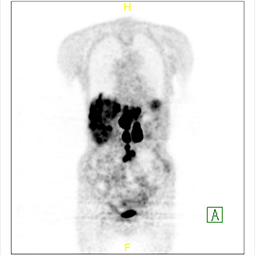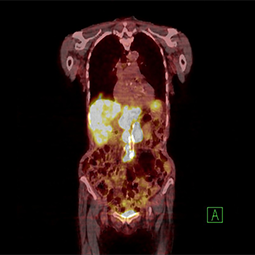Faster, easier PET/CT scan reduces radiation, identifies more tumors
February 28, 2018
The GA68 Dotatate PET/CT scan has arrived at NCH and it’s replacing the Octreoscan to detect tumors in patients with a history of neuroendocrine tumors.

Surgical oncologist Malcolm Bilimoria, M.D. is one of the doctors who eagerly awaited the new scan.
“I’m very happy to have the neuroendocrine PET/CT scan, also called a Dotatate PET/CT scan, at NCH,” Dr. Bilimoria says. “It allows for better clarity of the extent of disease and is used to make important treatment decisions.”
This PET/CT scan, which uses the isotope injection gallium Ga68, can be ordered by an oncologist or internal medicine physician and offers several benefits to patients, according to NCH Nuclear Medicine Facilitator Paul Rissmann, NMTCB. By using it, physicians are seeing a 71 to 80 percent change in clinical management, according to The National Center for Biotechnology Information.
“We’re more able to pinpoint the location of the abnormalities,” Rissmann says. “We’re seeing isotope uptake that never would have shown up on our previous scans.”
The biggest advantages of the GA68 Dotatate PET/CT scan are:
- It is more sensitive and specific than Octreoscan.
- It is easier for the patient, requiring only two hours for the test versus Octreoscan’s two-day protocol.
- It reduces radiation exposure to the patient.

Dr. Bilimoria explains the new isotope is taken up by the tumors, and the scan, in turn, exposes the area of tumors that might not be appreciated on standard CT or Octreoscan imaging.
“So far, I have had two patients in whom we found a tumor in the liver, despite a normal appearing CT scan,” Dr. Bilimoria says. “Patients with a history of neuroendocrine carcinoma should see us at the Illinois Center for Pancreatic and Hepatobiliary Diseases to see if this important scan could help them.”
Radiologist Peter Cormier, M.D., adds, “The new scan is physiologic. It acts on the physiologic information and the PET/CT scan fuses that information with the anatomy of the body.”
Dr. Cormier has been reaching out to oncology groups to inform them about the new GA68 Dotatate PET/CT scan.
“We want to get the word out that we are excited to have this test as it’s going to help the patients and the clinicians,” Dr. Cormier says.
For clinical questions on the scan, email pcormier@nch.org or call 847-618-5956. For detailed information on the process for ordering the scan, email prissmann@nch.org or call 847 618-5941.
In EPIC, this procedure can be ordered as “NM PET Restage Neuroendocrine Tumor.”